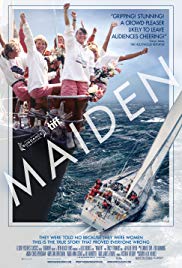By Glenn Dunks
 Did anybody see that Colin Firth movie about the amateur sailor who attempted to circumnavigate the world and failed miserably. It was called The Mercy, and while I never watched it, I did think of it as I watched Maiden. This is a film with such a remarkable true story that I couldn’t believe nobody had made a film out of it already but they had made The Mercy. Although I suppose one shouldn’t expect more: a movie about a male failure will almost always get made before that of a female success. But now we have Maiden, which puts a full stop at the end of that and seeks to settle a few more filmmaking blindspots with its oft-exhilarating telling of Tracy Edwards, a 24-year-old rebel who in 1989 became the skipper of the first ever female crew to compete in the Whitbread Round the World boat race.
Did anybody see that Colin Firth movie about the amateur sailor who attempted to circumnavigate the world and failed miserably. It was called The Mercy, and while I never watched it, I did think of it as I watched Maiden. This is a film with such a remarkable true story that I couldn’t believe nobody had made a film out of it already but they had made The Mercy. Although I suppose one shouldn’t expect more: a movie about a male failure will almost always get made before that of a female success. But now we have Maiden, which puts a full stop at the end of that and seeks to settle a few more filmmaking blindspots with its oft-exhilarating telling of Tracy Edwards, a 24-year-old rebel who in 1989 became the skipper of the first ever female crew to compete in the Whitbread Round the World boat race.
Bless whoever invented the 16mm camera because anybody whose worth having a documentary about them apparently had one of them handy all the damn time...
The footage here is wonderful, capturing the camaraderie and round robin skills of Edwards and her crew with a surprisingly steady hand (all things considered; the Southern Ocean is not known for its placid waters). The talking head interviews with them plus her manager and at least one of her rivals from a much wealthier competing team fill in the blanks, but are not the main attraction here.

Yes, Edwards’ tale of feminist achievement is the sort of rousing story that frequently put a massive grin on my face when the details of their unexpected success make them international celebrities, but what I found most interesting about Maiden was the element of class. The film’s early passages detail the struggles to find a sponsor — all too many organisations worried at the negative press that could come from the women capsizing than imagining the windfall of a potentially historic victory — but while director Alex Holmes never directly zeroes in on the obvious cavernous distance of the wealth and social status that hovers between Edwards, her crew, and the very class-dominated field of sailing that these women found themselves trying so desperately to be a part of, it is nonetheless an unavoidable slice of the narrative that gives dimension to the film. I’m going to assume the Colin Firth sailboat movie doesn’t even suggest an idea of it.
Maiden is proving to be yet another non-fiction success at the box office. To the surprise of absolutely nobody, people actually want to see a story like this on screen.
But far more interesting to me was the trickier prospect of Marcus Lindeen’s The Raft. Like Maiden, Lindeen utilises some fascinating 16mm footage of people adrift on the high seas in a seemingly mad fit of adventurous folly. Whereas the subjects of Maiden went on their trip as professional sailors (well, as professional as you could be with as few opportunities to be as such), those in The Raft do so as scientific guinea pigs, chosen solely for how much they could provoke the other people on the boat. Chosen by a researcher who casts the same lens to assembling his crew as a casting agent on Big Brother.
In another duality with Maiden, the group of people that those in charge believed would devolve into bickering and ultimately fail to even get off the ground, those in The Raft prove to be remarkably well-suited to one another’s time together with the scientist at its head turning increasingly villainous as his lab rats failed to become the violent and aggressive examples of humanity that he expected. Labelled “The Sex Raft” in the press due to its even split between male and female participants and the idea that, of course, they wouldn't be able to keep their hands off one another, their story is remarkably interesting for reasons that have nothing to do with the salacious. This is a science experiment from 1973 that nearly 50 years later holds every ounce of its initial intrigue. An anthropological time capsule.

Punctuated by talking heads that have a unique twist to them – Lindeen has the surviving participants interact on a recreation of the raft made of pine on a soundstage – The Raft is keen to shine a spotlight on the gender dynamics. Those that eventuated, and those that were expected. Likewise race, like in a central sequence in which the one black female rafter discusses her experience on board with stark clarity.
Maiden and The Raft make strong bedfellows and not just because of their surface similarities as movies set on the wild seas. Although I prefer the latter for the way it is constructed with something of a surprising smirk on its face, I enjoyed both for the way they plucked at ideas that sit just below the surface.
Release: Maiden is still in theatrical release and expanding. The Raft is still in a small number of theatres, but won’t last long.
Oscar chances: It’s a big yes for Maiden, although I wonder if it may fall prey to what happened to Jane two years prior. The Raft has unfortunately not struck through either critically or commercially and if Maiden is a hit in the awards race, I can’t imagine a second one like it joining in.